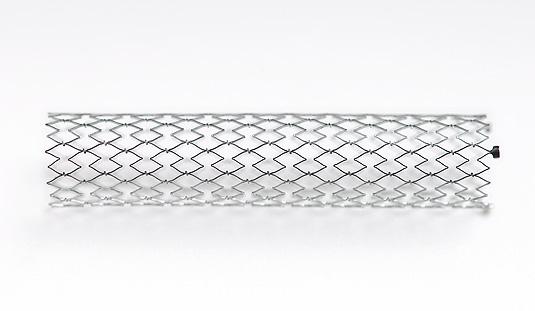July 21, 2014 – Stentys announced the publication of an article in the Journal of the American College of Cardiology (JACC) entitled, "Causes of Early Stent Thrombosis in Patients Presenting with Acute Coronary Syndrome: An Ex Vivo Human Autopsy Study."
Researchers led by Renu Virmani, MD, of the CVPath Institute, examined autopsy cases of 67 stented coronary lesions from 59 patients who presented with acute coronary syndrome (ACS) and died within 30 days of stent implantation. They identified that 34 patients (58%) died from early stent thrombosis (ST). The authors found that the occurrence of malapposition, medial tear and necrotic core prolapse was greater in the early ST group than the non-ST group (34% vs. 18%, p=0.008, 27% vs. 15%, p=0.004, and 28% vs. 11%, p<0.001 respectively) and that they were independent risk factors associated to ST.
According to the authors: "While complete stent apposition may be important to avoid incomplete apposition in rupture-prone lesions, excess medial tear secondary to high inflation pressure was found to be a major determinant of early ST."
The authors suggested that "improvement in implantation technique and refinement of stent design may improve clinical outcomes of ACS patients."
When treating heart attack patients, cardiologists often cannot determine artery diameter with certainty because of the clot and vessel contraction. When selecting a conventional stent, they risk under-sizing (which can lead to malapposition) or over-sizing (which can cause vessel wall tear), and either scenario increases the likelihood of heart attack recurrence and death.
Stentys’ Self-Apposing Stent is designed to adapt to the vessel’s unknown diameter, particularly in the post-infarction phase, in order to prevent the malapposition or excessive inflation problems associated with conventional stents. Results from Stentys' APPOSITION II clinical trial, published by JACC Cardiovascular Interventions in December 2012, showed 28% of malapposition in conventional stents three days after implant versus 0% for Stentys stents (p<0.001).
Gonzague Issenmann, co-founder and Chief Executive Officer of Stentys said: "Dr. Virmani and her colleagues have confirmed that malapposition leads to serious complications for patients with acute coronary syndrome. The Self-Apposing Stent data not only shows greatly reduced rates of malapposition compared with conventional stents but also very low mortality rates."
For more information: www.stentys.com/file_bdd/documents/1399469104_Stentys_JACC_PrVermani_PR.pdf
Reference:
Nakano M, Yahagi K, Otsuka F, Sakakura K, Finn AV, Kutys R, Ladich E, Fowler DR, Joner M, Virmani R. "Causes of Early Stent Thrombosis in Patients Presenting with Acute Coronary Syndrome: An Ex Vivo Human Autopsy Study." Journal of the American College of Cardiology (2014), doi: 10.1016/j.jacc.2014.02.607.

